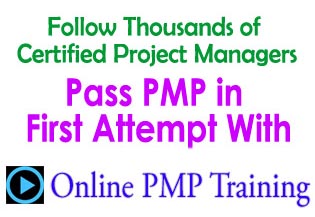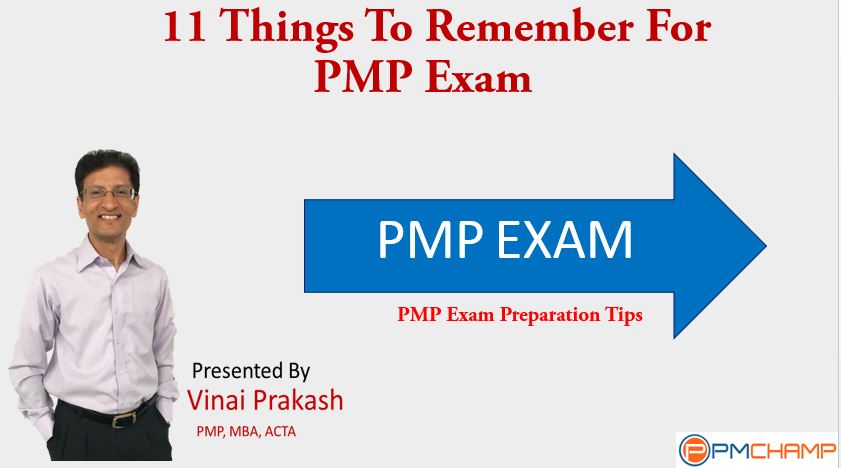There are some universal fundamental truths that you must remember to answer the PMP exam questions correctly. You may not have come across these “truths” in your existing projects, so you may think them to be “false”, “not correct” or simply “not possible”. However, this is a mistake many PMP aspirants make. And it turns out be a costly mistake.
So review these PMP Tips with care, and remember them to be TRUE for the PMP Exam. These tips are all good for the content covered in the PMBOK Guide, Fourth Edition published by PMI.
Here is the top 11 things to remember for your PMP Exam:
- You always have access to “Lessons Learnt” from past projects – which you can access to aid you in proper planning and execution.All you need is to ask your PMO (Project Management Office) for these past historical records. Collectively, they are called “Organizational Process Assets”, and are used as Inputs to almost all processes.
- PMI does not approve of “Gold Plating” – giving extra value to the customer, without their asking.Your goal is to only deliver what is written in the project charter and the statement of work, and nothing else. That’s because when you start to gold-plate, you may think that you are adding value, but this extra value may impact other aspects of the triple constraints, and create potential risk in other areas.
- Your project is a “big”, mega project – employing hundreds of people from different cultures, in multiple countries, and it it is a mega project – like sending a man to moon or hosting the Olympics in your country.Most small projects do not have the need to employ each and every knowledge area in detail.
- You work in a “matrix” organization – Unless stated otherwise, always assume that you work in a matrix organization type – not functional, and never projectized. So you always need to work for resources with other project managers, functional managers, and the PMO.

- You are a “proactive” project manager – always thinking, planning and taking action before things go wrong. You are not a reactive project manager, who only fights fires, but you spend time avoiding fires in the first place.
- Quality is always planned in the project – not inspected after the product or service has been produced. This ties in to being proactive, and taking action to make a quality product or service, and not inspect it after the fact, for problems. Fixing problems after the fact is always costly, time consuming, and it is never as good as new.
- Your project is always initiated using a Project Charter – The sponsor or a manager external to the project signs the project charter, giving you – the project manager, full authority to make use of the budget, get resources, and start the project planning, executing and delivery. The project manager is named in the project charter, and this becomes a top document to refer to, in case of any confusion, doubts or for clarity on the scope, time, budget, risk, assumptions, constraints etc. It can be shown to all kind of stakeholders to communicate the vision and objectives of the project.
- You always look out for New Risks – to identify areas which may cause potential problems in your projects. You should be asking your team members for risk identification, planning the risk mitigation strategies, and qualifying, quantifying them for probability and impact all the time.
- You are an “ethical” project manager – If you see a conflict of interest, you will quickly remove yourself from the situation, and inform the management of the conflict of interest. Keeping quiet, or not highlighting it is a wrong thing, and completely unethical.
- You never call meetings just to find out the status – there are other ways to find the task status – reports, updates to intranets, project plans and documentation. Do not call a meeting of all key players, and go around the table asking for status. Call meetings only to discuss problems, brainstorming, planning and proactive ideas, not to just collect the status.
- Cautiously guard the scope, timeline and budget of the project. Do not allow changes to it easily. All changes must be formally approved by the Change-Control Board (CCB) through a change control process.
Hope this helps in your PMP exam. Post your comments.
Cheers,
Vinai Prakash, PMP
Founder of PMChamp.com – providing you with tips and tricks to pass the PMP exam in your first attempt.
Prepare for the PMP Exam – One Hour a Day only – Join PMChamp PMP Exam Prep Coaching Workshop.
Get 20 Free Mock Questions on Quality Management
Just fill in your details here:



Very useful in real life scenarios…. Can be instrumental if these 11 things are put to practice esp. the 5th, 6th , 9th and 10th point !
What are the major names to remember for the PMP exam – e.g. Taguchi, Marlow,…? Please provide list or source – am preparing for the exam.
Your Comments are of excellent help for pmp aspirants
Superb 11 points for the PMP prepartion